 |
Picks is a monthly sampling of Japan's art scene, offering commentary by a variety of reviewers about exhibitions at museums and galleries in recent weeks, with an emphasis on contemporary art by young artists. |
 |
 |
|
|
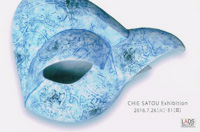 |
|
| Chie Satou Exhibition |
| 26 - 31 July 2016 |
LADS Gallery
(Osaka) |
 |
| Since she began devoting herself to ceramic art in the early 1990s, Satou has excelled at contrasting motifs -- objects that resemble animals, Jomon dogu figurines, and Shinto ritual implements on the one hand, and elegant modern forms on the other. All of her works are exquisitely designed and evince a master's touch with glazes and clay slips. It is a mystery why someone of such talent chose to take a six-year break, then reemerged to produce work at an even higher level. |
|
|
 |
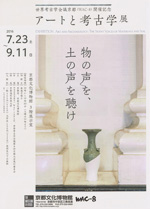 |
|
| Art and Archaeology: The Silent Voices of Materials and Soil |
| 23 July - 11 September 2016 |
The Museum of Kyoto
(Kyoto) |
 |
| Three Kyoto museums ran concurrent, like-themed exhibitions on the occasion of the World Archaeological Congress (WAC) held in the city this past summer. The Museum of Kyoto offered a particularly intriguing exploration of the potential for collaborations between artists and archaeological artifacts. Examples include the reimagining of drawings of artifacts and sites as art, and the reincarnation of pottery shards as art objects. |
|
|

|
 |
 |
|
 |
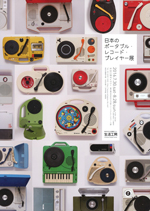 |
 |
| Portable Record Players of Japan |
| 30 July - 28 August 2016 |
Lifestyle Design Center
(Tokyo) |
 |
| Some 100 portable record players dating back to the 1960s through the 80s filled the gallery -- the collection of the owner of Enban, a record shop in Koenji, Tokyo. The sheer diversity of designs, colors, textures, and sizes of the handy phonographs produced and sold by Japanese manufacturers testifies to the prominent place of "record culture" in people's lives during that period. |
|
|
|
|
|
|
|

|
 |
 |
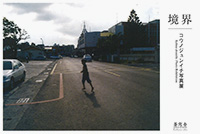 |
 |
| Junichi Kohno: Borders |
| 1 - 14 August 2016 |
Gallery Sokyusha
(Tokyo) |
 |
| Kohno shot the 38 photos in this solo exhibition in Hong Kong, Macau, Taiwan, and China in 2011 and 2012. Wandering urban backstreets and pressing his shutter when the urge strikes, he seems determined to prevent any whiff of the element of the extraordinary in travel from entering the frame. Indeed, a lack of variation could be said to be the defining quality of his travel pictures. Also intentional, no doubt, is the lack of a single subject looking directly at the camera. |
|
|
 |
 |
| Akira Mitamura: Hiroshima Element |
| 29 July - 11 August 2016 |
photographers' gallery
(Tokyo) |
 |
| Mitamura's photographs have a relaxed, carefree air. And yet there is a complex undercurrent in his stated objective of "expressing the joy of photography in Hiroshima." This is not just any city, and viewers of Mitamura's images are bound, for better or worse, to perceive in them a dual Hiroshima, the seen and the unseen. The question arises: how does one elicit from this duality a sense of Hiroshima's unique society and culture? |
|

|
 |
 |
 |
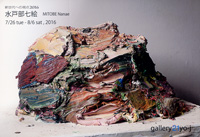
|
|
| Nanae Mitobe |
| 26 July - 6 August 2016 |
gallery21yo-j
(Tokyo) |
 |
| These days a number of artists use paint not as a means of expressing color but to create texture and mass. Mitobe's paintings take such applications to unprecedented heights, literally: the paint lies about 10 cm thick on her smaller canvases, reaching 60 cm on the largest ones. If these works were hung vertically on a wall, the paint would slide to the bottom, so she displays them at an oblique angle. The result is art that barely inhabits the realm of painting, as opposed to sculpture. |
|
|
 |
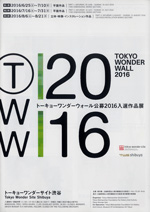 |
 |
| Tokyo Wonder Wall 2016, Part 3 |
| 6 - 21 August 2016 |
Tokyo Wonder Site Shibuya
(Tokyo) |
 |
| Following two installments devoted to two-dimensional art, the third part of this year's Wonder Wall featured 3D works, videos, and installations. Many were visually stimulating but their intention was hard to fathom. Sonomi Hori's Mirror Emotions, on the other hand, was subdued yet resonant. Sixteen uneven-surfaced gypsum boards were lined up in a row. Closer inspection revealed that the board at one end was colored and extremely bumpy; as one moved down the line the boards grew whiter and smoother. An effective work, though its close resemblance to the 1970s output of post-Monoha artists gives one pause. |
|
|
|
|
|
|
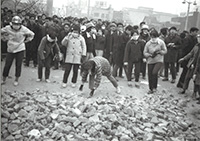 |
 |
Mitsutoshi Hanaga Archives Project |
23 July - 20 August 2016 |
AOYAMA | MEGURO
(Tokyo) |
 |
| Divided into sections on art, theater, dance, and society, this was a thorough retrospective of the late photographer's work from the 1960s through the 80s, with over 200 mostly monochrome prints covering the walls. Hanaga (1933-99) was a particularly avid portraitist of his contemporaries on the avant-garde scene -- Shuzo Takiguchi, Junzaburo Nishiwaki, Genpei Akasegawa, Natsuyuki Nakanishi, Arata Isozaki, Juro Kara, and on and on. Women, however, are conspicuous in their absence -- was the photographer just a shy guy? |
|
 |
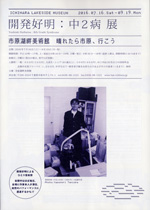 |
 |
| Yoshiaki Kaihatsu: Chu-ni-byo |
| 16 July - 19 September 2016 |
Ichihara Lakeside Museum
(Chiba) |
 |
| Chu-ni-byo (roughly, "eighth-grade-itis") is a sardonic term coined to describe thought and behavior characteristic of puberty, when junior high students in particular become painfully aware of sex, themselves, and society. Kaihatsu, who garnered a following with his Mole TV installation at the museum's Ichihara Art x Mix festival in 2014, has certainly channeled his adolescent muse in this solo show with works that may be serious, or a poke at the self-importance of art museums, or both. Everything on display contains large dollops of pop, kitsch, and a "handmade" ethos. |
|
|
|
|
 |
|